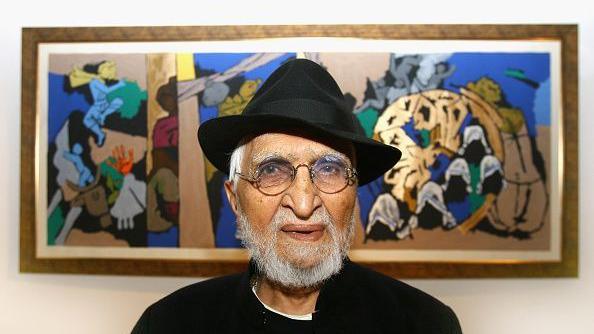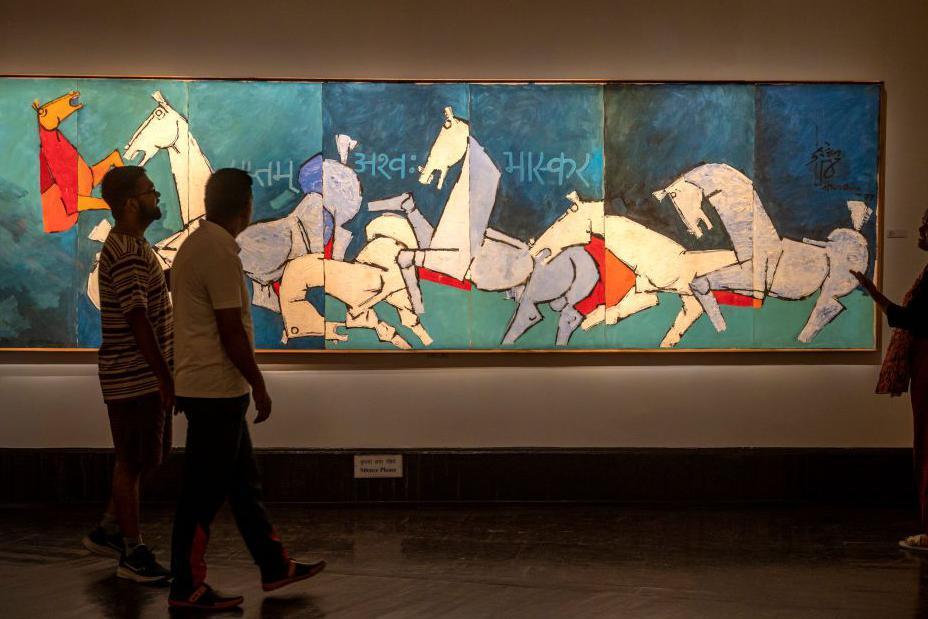India court orders seizure of 'offensive' MF Husain paintings

MF Husain's paintings have often attracted controversy due to their depiction of Hindu gods
- Published
A court in the Indian capital, Delhi, has ordered the seizure of two "offensive" paintings by MF Husain, one of India's most famous artists.
The court on Monday granted permission for the police to seize the artworks after a complaint was filed alleging that the paintings, displayed at an art gallery and featuring two Hindu deities, "hurt religious sentiments".
Husain, who died in 2011 aged 95, often faced backlash for the depictions of nude Hindu gods in his paintings.
The Delhi Art Gallery (DAG), which hosted the exhibition, denied any wrongdoing and stated that a "detailed" police investigation found no "cognisable offence" by the gallery.
The exhibition Husain: The Timeless Modernist at DAG showcased over 100 paintings from 26 October to 14 December.
The complainant, Amita Sachdeva, a lawyer, said on X that on 4 December, she photographed the "offensive paintings" displayed at the DAG and, after researching previous complaints against the late artist, filed a police complaint five days later.
On 10 December, Ms Sachdeva reported that she visited the gallery with the investigating officer, only to discover that the paintings had been removed. She claimed that the gallery officials asserted they had never exhibited the paintings.
The paintings that Ms Sachdeva shared online depicted Hindu gods Ganesha and Hanuman alongside nude female figures. She also alleged that the Delhi police had failed to file a report.
She later petitioned the court to preserve the CCTV footage from the gallery during the period when the paintings were reportedly on display, according to media reports.
On Monday, a judge at Delhi's Patiala House Courts said that the police had accessed the footage and submitted their report. According to the inquiry, the exhibition was held in a private space and was intended solely to showcase the artist's original work, the judge added.
The DAG said in a statement that it had been assisting police with their inquiries. It said the exhibition had attracted about 5,000 visitors and had received "positive reviews in the press as well as from the public".
The complainant had been the only person to raise any objection to any of the artworks in the exhibition, the gallery said.
"The complainant has herself displayed and publicised the images of the drawings over social media and television news media deliberately intending them to be viewed by a larger audience, while contending that the same images hurt her personal religious sentiments."

Husain was often called the "Picasso of India"
Maqbool Fida Husain was one of India's biggest painters and was called "Picasso of India" but his art often stirred controversy in the country. His works have sold for millions of dollars.
His career was marked by controversy when he was accused of obscenity and denounced by hardline Hindus for a painting of a nude goddess.
In 2006, Husain publicly apologised for his painting, Mother India. It showed a nude woman kneeling on the ground creating the shape of the Indian map. He left the country the same year and lived in self-imposed exile in London until his death.
In 2008, India's Supreme Court refused to launch criminal proceedings against Husain, external, saying that his paintings were not obscene and nudity was common in Indian iconography and history.
The court had then dismissed an appeal against a high court ruling that quashed criminal proceedings against Husain in the cities of Bhopal, Indore and Rajkot, condemning the rise of a "new puritanism" in India.
The court also rejected calls for Husain, then in exile, to be summoned and asked to explain his paintings, which were accused of outraging religious sentiments and disturbing national integrity.
"There are so many such subjects, photographs and publications. Will you file cases against all of them? What about temple structures? Husain's work is art. If you don't want to see it, don't see it. There are so many such art forms in temple structures," the top court said.
Many believe there is a rising tide of illiberalism against artistic expression in India.
In October the Bombay High Court reprimanded the customs department, external for seizing artworks by renowned artists FN Souza and Akbar Padamsee on the grounds that they were "obscene material."
The court ruled that not every nude or sexually explicit painting qualifies as obscene and ordered the release of seven seized artworks.
Follow BBC News India on Instagram, external, YouTube,, external Twitter, external and Facebook, external.